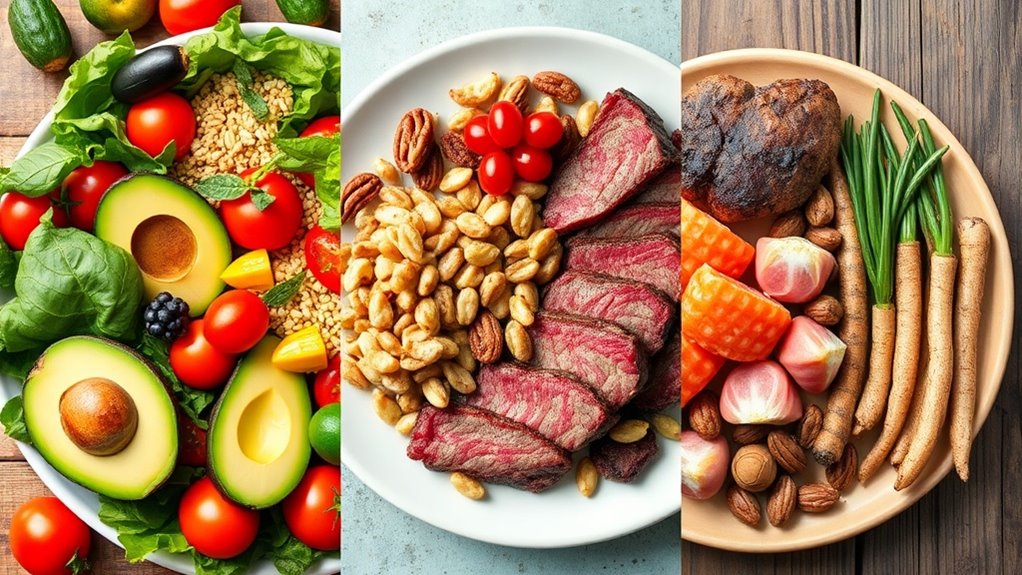Myths About Carbs That Are Sabotaging Your Weight Loss
You’ve probably heard that carbs are the enemy when it comes to weight loss. This myth can lead to drastic dietary choices that ultimately backfire. The reality is, not all carbs are created equal, and understanding their role in your diet is vital. Cutting them out entirely can slow your metabolism and create nutrient gaps. So, what’s the truth about carbs, and how can you use them to your advantage? Let’s explore.
Key Takeaways
- Carbs alone do not cause weight gain; overall calorie balance is the key factor in weight management.
- Whole-food sources of carbs, like fruits and whole grains, provide essential nutrients and promote satiety.
- Restricting carbs can lead to binge eating, undermining weight loss efforts and metabolic balance.
- Complex carbs digest slowly, stabilizing blood sugar and reducing cravings, making them better for weight management.
- Quality of carbs matters; prioritize high-fiber options for better energy levels and digestive health.
Carbs Are the Enemy: Understanding Their Role in Your Diet
Why do so many people consider carbs the enemy in their diets? This belief stems from popular carb myths that suggest they solely contribute to weight gain.
In reality, carbs are essential for energy, fueling your brain and muscles. The key is understanding the difference between refined and whole-food sources. Whole grains, fruits, and vegetables provide essential nutrients and fiber, promoting overall health. Instead of demonizing carbs, focus on moderation and balance. Incorporating complex carbohydrates into your diet can help stabilize blood sugar and reduce cravings.
All Carbs Are Created Equal: The Difference Between Simple and Complex Carbs
Have you ever wondered why some carbohydrates are considered healthier than others? The key lies in understanding simple and complex carbs. Simple carbs, like sugar and white bread, are quickly digested, leading to rapid spikes in blood sugar. In contrast, complex carbs, found in whole grains and legumes, digest more slowly, providing sustained energy and nutrients. They often contain fiber, which aids digestion and keeps you feeling full longer. Choosing complex carbs can help manage your weight and overall health, while consuming too many simple carbs can hinder your weight loss goals. It’s all about making informed choices! Additionally, fiber-rich foods help stabilize blood sugar levels and enhance satiety, making them an essential part of a weight loss strategy.
Cutting Carbs Completely: The Impact on Your Metabolism
Cutting carbs completely can lead to a slowdown in your metabolism, making it harder to maintain a healthy weight.
You might also experience energy deficiencies, as your body relies on carbohydrates for fuel.
Additionally, eliminating carbs may cause nutrient imbalances, depriving you of essential vitamins and minerals. Drastic calorie cuts can lead to a starvation state, which further complicates weight loss efforts.
Metabolic Slowdown Risks
How does completely eliminating carbohydrates affect your metabolism?
Cutting carbs can lead to a metabolic slowdown, impacting your weight loss journey.
Here are four key points to keep in mind:
- Reduced Energy Levels: Your body relies on carbs for energy; without them, you may feel fatigued.
- Muscle Loss: Insufficient carbs can cause muscle breakdown, slowing your metabolism further.
- Hormonal Changes: Low carb intake can disrupt hormones like insulin, affecting fat storage.
- Nutrient Deficiencies: Cutting carbs can limit essential nutrients, compromising overall health.
Understanding these risks can help you make informed dietary choices without jeopardizing your metabolism.
Energy Deficiency Consequences
While many people believe that cutting carbs completely can lead to quick weight loss, it’s important to take into account the energy deficiency consequences that may arise.
Your body relies on carbohydrates as a primary energy source.
When you eliminate them, you might experience fatigue, decreased physical performance, and difficulty concentrating.
Additionally, low energy levels can trigger cravings for high-carb foods, making it harder to stick to your diet.
Over time, this energy deficiency can slow your metabolism, counteracting your weight loss efforts.
Balancing your carb intake can help maintain energy levels and support sustainable weight management.
Nutrient Imbalance Issues
When you eliminate carbohydrates from your diet entirely, you risk creating a nutrient imbalance that can have serious implications for your metabolism.
This imbalance can lead to various issues, including:
- Decreased Energy Levels: Without carbs, your body may struggle to maintain adequate energy for daily activities.
- Muscle Loss: Insufficient carbs can hinder muscle repair and growth due to a lack of glycogen.
- Hormonal Disruptions: A carb-free diet can affect hormones like insulin and cortisol, impacting your metabolism.
- Nutrient Deficiencies: You may miss out on essential vitamins and minerals typically found in carb-rich foods, compromising overall health.
Eating Carbs at Night: Myth or Reality?
You might wonder if eating carbs at night really affects your metabolism or sleep quality. Research shows that while timing can influence glycogen storage, it’s not as detrimental as some believe. Understanding how your body processes carbs can help you make informed choices about your evening meals. Incorporating whole foods into your diet can also support better metabolism and overall health.
Timing and Metabolism Effects
Have you ever wondered whether eating carbs at night really affects your metabolism?
Research suggests that the timing of your carb intake has less impact on your weight than you might think.
Here are four key points to keep in mind:
- Total Daily Intake: Your overall calorie consumption matters more than when you eat.
- Metabolism Rate: Your metabolism doesn’t substantially slow down at night.
- Quality of Carbs: Choosing whole grains over refined carbs can benefit your health, regardless of timing.
- Personal Factors: Individual metabolism varies; what works for you may differ from others.
Focus on balance and moderation!
Glycogen Storage Considerations
How does your body handle glycogen storage when you eat carbs at night?
Your body stores carbohydrates as glycogen in muscles and the liver, regardless of when you consume them.
Eating carbs at night doesn’t automatically lead to weight gain; it’s the overall caloric intake that matters.
If your total daily calories are within your needs, nighttime carbs won’t hinder your weight loss goals.
However, consider your activity level—if you’re less active in the evening, your glycogen stores mightn’t get fully utilized.
Balance is key; focus on nutrient quality and portion sizes for effective glycogen management.
Sleep Quality and Carbs
What impact do nighttime carbs have on sleep quality?
Consuming carbs before bed can influence your rest, but it’s essential to evaluate what you choose.
Here are four key points:
- Serotonin Production: Carbs can boost serotonin, promoting relaxation and better sleep.
- Blood Sugar Regulation: Balanced carbs prevent spikes and crashes, aiding in uninterrupted sleep.
- Digestive Comfort: Light, easily digestible carbs are less likely to disrupt your sleep.
- Weight Management: Eating carbs in moderation at night won’t necessarily sabotage your weight loss goals if overall intake is controlled.
Be mindful of your choices for ideal sleep quality!
The Glycemic Index: Why It Matters More Than You Think
The GI measures how quickly foods raise your blood sugar levels.
Foods with a high GI can cause rapid spikes in blood sugar, leading to energy crashes and increased hunger.
By choosing low to moderate GI foods, you can help maintain stable energy levels and reduce cravings.
This can be especially important for weight management.
Incorporating whole grains, fruits, and vegetables into your meals can provide essential nutrients while keeping your GI in check.
Understanding the GI empowers you to make informed choices for better health and weight loss success. Additionally, focusing on nutrient-dense foods can further enhance your weight loss efforts by providing essential vitamins and minerals without excessive calories.
Carbs and Weight Gain: Debunking the Calorie Myth
Ever wondered why carbs are often blamed for weight gain?
It’s time to debunk that myth.
Weight gain isn’t just about carbs; it’s about the overall calorie balance.
Here are key points to note:
- Caloric Surplus: Consuming more calories than you burn leads to weight gain, regardless of the source.
- Quality Matters: Whole grains and fruits provide nutrients and fiber, aiding weight management.
- Metabolic Response: Your body processes different carbs differently, impacting hunger and energy.
- Sustainability: Restricting carbs may lead to binge eating, sabotaging long-term goals.
Incorporating smaller, nutrient-dense meals can help maintain energy levels and support your weight loss journey.
Focus on balance, not elimination!




